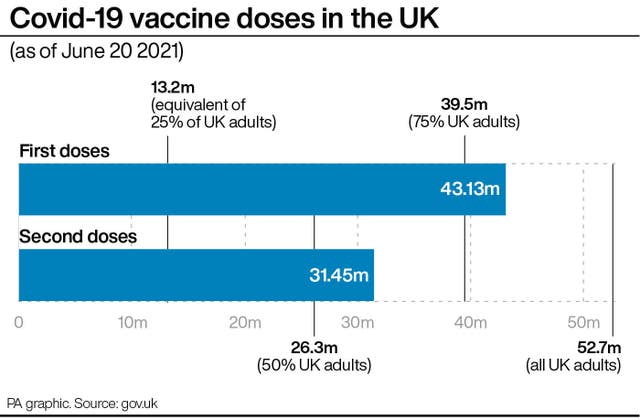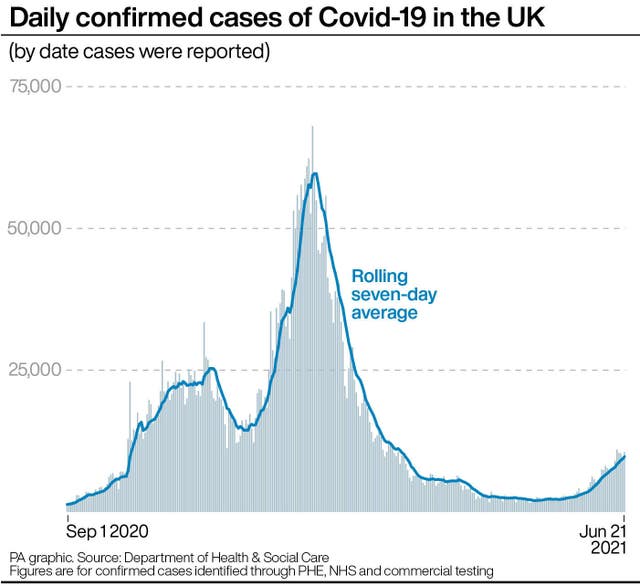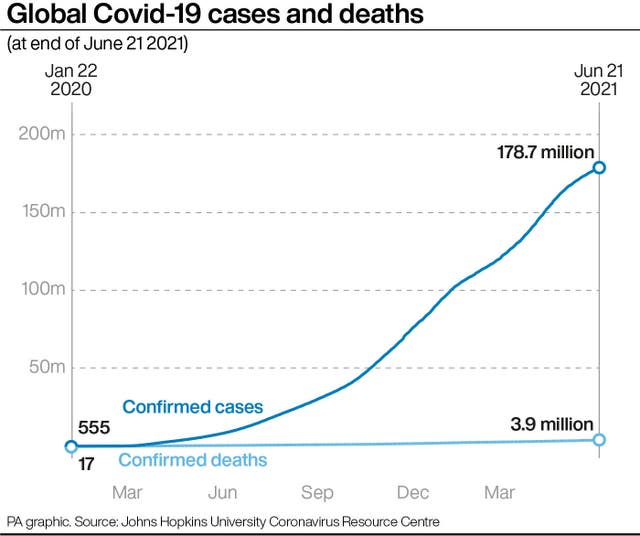
The Government is “working on” plans for quarantine-free travel for fully vaccinated Britons but international travel remains a “difficult” area, Matt Hancock has said.
The Health Secretary confirmed that ministers are looking at how to scrap the requirement for people to isolate for 10 days on return from an amber list country.
He said he is “in favour of moving forward in this area” and replacing quarantine with daily testing.
“This hasn’t been clinically advised yet – we’re working on it,” he told Sky News.
“We’re working on plans to essentially allow the vaccine to bring back some of the freedoms that have had to be restricted to keep people safe.
“After all, that’s the whole purpose of the vaccination programme, that’s why it’s so important that every adult goes out and gets the jab.”
 (PA Graphics)
(PA Graphics)
Asked if these plans could be in place as soon as August, Mr Hancock said: “We’ll get there when it’s safe to do so.”
Speaking on LBC radio, he said the Government is being “cautious about international travel” in order to protect the progress at home.
But he added: “Having said that, the whole point of the vaccine programme is to be able to remove restrictions, and for people to be able to be kept safe by the vaccine rather than by these rules.
“So we are working on a plan for the double-vaccinated people, using tests, and to have that testing regime in place, instead of having to have the quarantine in some circumstances.
“We’re working with the clinicians, because we want to make sure the plan is safe and secure, so I can’t give you a date but what I can tell you is that I’m in favour of moving forward in this area.”
 (PA Graphics)
(PA Graphics)
The Health Secretary also said the Government is “on track” for the July 19 easing of restrictions in England, but acknowledged that opening up travel abroad is “more difficult”.
He told Sky News: “Thankfully, because of the vaccination programme, we have been able to free up a huge number of the restrictions here at home.
“We are on track to deliver the Step 4, the further openings, on July 19, which is good.
“We are also looking to see how we can replace the protections that are currently there with the restrictions with protections that come from the vaccine, with respect to international travel as well.
“But it is more difficult freeing up international travel.”
Mr Hancock said the main NHS app, which is different from the Covid-19 app and records vaccination status, is “important” as countries are likely to need proof that Britons travelling abroad have had their jabs.
“We can now, all of us, see our vaccine status, see your testing status, on the NHS app,” he said.
“Six million people have now downloaded the main NHS app and on that you can show whether you have had the jabs.
“It’s important because we know other countries are going to say that they want proof that you have been vaccinated before you go.
“So, when travel is opened up, we are going to make sure people have got that ability to prove it.”
 (PA Graphics)
(PA Graphics)
On Monday, Boris Johnson played down suggestions that restrictions on foreign travel could be lifted.
Speaking during a visit to a laboratory in Hertfordshire, the Prime Minister said: “I want to stress that this is going to be – whatever happens – a difficult year for travel.
“There will be hassle, there will be delays, I am afraid, because the priority has got to be to keep the country safe and stop the virus coming back in.”
People returning from a green list country are not required to enter quarantine, but there are no major viable tourist destinations in that tier following the removal of Portugal.
The amber list includes most popular summer hotspots such as Spain, Italy, France and Greece.
Ryanair and Manchester Airports Group – which owns Manchester, Stansted and East Midlands Airports – are preparing legal action, calling for more transparency over how Whitehall decides which countries are on the green, amber and red lists.
The first “checkpoint” review since the traffic light system was introduced is due to take place on June 28.



Why are you making commenting on The Herald only available to subscribers?
It should have been a safe space for informed debate, somewhere for readers to discuss issues around the biggest stories of the day, but all too often the below the line comments on most websites have become bogged down by off-topic discussions and abuse.
heraldscotland.com is tackling this problem by allowing only subscribers to comment.
We are doing this to improve the experience for our loyal readers and we believe it will reduce the ability of trolls and troublemakers, who occasionally find their way onto our site, to abuse our journalists and readers. We also hope it will help the comments section fulfil its promise as a part of Scotland's conversation with itself.
We are lucky at The Herald. We are read by an informed, educated readership who can add their knowledge and insights to our stories.
That is invaluable.
We are making the subscriber-only change to support our valued readers, who tell us they don't want the site cluttered up with irrelevant comments, untruths and abuse.
In the past, the journalist’s job was to collect and distribute information to the audience. Technology means that readers can shape a discussion. We look forward to hearing from you on heraldscotland.com
Comments & Moderation
Readers’ comments: You are personally liable for the content of any comments you upload to this website, so please act responsibly. We do not pre-moderate or monitor readers’ comments appearing on our websites, but we do post-moderate in response to complaints we receive or otherwise when a potential problem comes to our attention. You can make a complaint by using the ‘report this post’ link . We may then apply our discretion under the user terms to amend or delete comments.
Post moderation is undertaken full-time 9am-6pm on weekdays, and on a part-time basis outwith those hours.
Read the rules hereLast Updated:
Report this comment Cancel